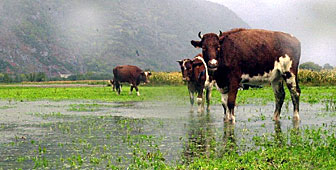Antibiotics may contaminate drinking water

Fields in Switzerland are being contaminated with antibiotics used to treat animals -- placing drinking water at risk, according to scientists.
New research has shown that antibiotics present in manure sprayed on fields to fertilise them could be helping to create a generation of antibiotic-resistant bacteria, which do not easily dissolve in soil and which could seep into drinking water supplies.
“The use of antibiotics in livestock production induces antibiotic resistance in bacteria that can then enter the food chain. If you apply that manure onto agricultural fields, it’s possible that humans could be contaminated,” says Stephan Müller, head of the water and agriculture division of the Federal Institute for Environmental Science and Technology in Dübendorf.
Müller is currently investigating the possibility that the antibiotic compounds seep into the soil and then enter drinking water supplies.
One such group of antibiotics is sulphonamides, which do not easily degrade or dissolve in water. Müller says his sample analysis found that Swiss farm manure contains up to 20 parts per million of sulphonamides. That means each hectare of field could be contaminated with up to 1 kilogram of the drugs.
The findings are particularly surprising in light of Switzerland’s ban on the use of antibiotics as growth promoters in animal feed. But the benefits of the ban are being compromised by a rise in the therapeutic use of antibiotics to treat sick animals, says Müller.
Super resistance
Another area of concern is that bacteria are becoming increasingly resistant, says Müller.
“The main danger is that we are producing increasingly resistant bacteria [which could cause diseases in animals] and which we cannot fight off with chemicals,” says Mueller. “It’s of concern not only in Switzerland but all over the world.”
“A lot of research should be done into farming systems to cut down on the use of antibiotics are much as possible and to build up livestock production systems that don’t use antibiotics – it’s the only way to go,” Müller continued.
The Worldwide Fund for Nature (WWF) last year issued warnings that the presence of hormones and other chemical substances from fertilisers, antibiotics and perfumes in Switzerland’s rivers could pose a potential threat to human health.
by Vanessa Mock and Samantha Tonkin

In compliance with the JTI standards
More: SWI swissinfo.ch certified by the Journalism Trust Initiative
You can find an overview of ongoing debates with our journalists here . Please join us!
If you want to start a conversation about a topic raised in this article or want to report factual errors, email us at english@swissinfo.ch.